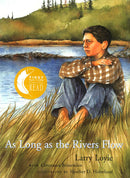Description
As Long as the Rivers Flow: A Last Summer Before Residential School is a poignant story for children about the joyous summer spent in northern Alberta in 1944. The story focuses on the daily routine of a ten-year-old Cree boy named Lawrence. His days are filled with family activities and personal adventures. At the beginning of summer Lawrence overhears the adults talking about how the children would have to attend a school far away and that this school was something like prison. Lawrence considers what this means but quickly resumes the daily adventures that involves caring for a young owl; learning to tan hides and sewing with his grandmother; and picking berries with his family. All of the activities involve learning and are spent among caring family members who gently teach each child how to live with nature. During the evenings, Lawrence enjoys listening to the elders tell stories. During one of these evenings, Lawrence receives his new Cree name that means "young man." Lawrence believed that he was beginning to contribute to the family's livelihood and that he would soon take up his role as a hunter. However, the summer ends abruptly when a truck comes to take Lawrence and other children away to residential school. Here Lawrence would join with hundreds of other First Nations children and enter the world of church-run residential schools. It was at St. Bernard's Mission School where Lawrence would learn English and manual trades far away from his nurturing and loving family. The final pages of the book switch to stark black and white archival photographs of Lawrence and other children at the Alberta residential school. Background information explains the role of the school and what the regimented life was like for the students. Larry Loyie has written a compelling story for children about the lifestyle of Cree people during the mid-twentieth century. After reading the story illustrated with the pastel watercolour drawings, students can begin to understand the impact of residential schools on generations of First Nations children. The narrative approach shows readers what this Cree family was like during the last summer before residential school. Themes of family values, learning by doing, and Cree culture add to the book's value. It is highly recommended for elementary students. Winner of the Norma Fleck Award for Canadian Children's Non-Fiction, 2003. Highly recommended. Guided Reading Level: S; Reading Level: 4.6; ATOS Reading Level: 3.9.


